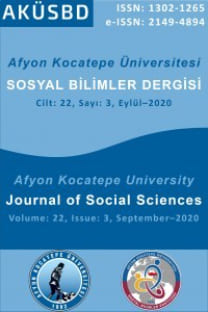Okul Öncesi Dönem Çocuklarının Küresel Isınma Hakkındaki Düşüncelerinin İncelenmesi
Examination of Preschool Children's Thoughts on Global Warming
___
- Ahi, B. ve Özsoy, S. (2005). İlkokullarda görev yapan öğretmenlerin çevreye yönelik tutumları:Cinsiyet ve mesleki kıdem faktörü. Kastamonu Eğitim Dergisi, 23(1), 31-56.
- Akın, G. (2006). Küresel ısınma, nedenleri ve sonuçları. Ankara Üniversitesi Dil ve Tarih-Coğrafya Fakültesi Dergisi, 46(2), 29-43.
- Aksan, Z. ve Çelikler, D. (2013). İlköğretim öğretmen adaylarının küresel ısınma konusundaki görüşleri. Eskişehir Osmangazi Üniversitesi Sosyal Bilimler Dergisi, 14(1), 49-67.
- Bozdoğan, A. E. (2011). “Küresel ısınma” sorunu hakkında eğitim alanında yapılan çalımalardan bir derleme. Kuram ve Uygulamada Eğitim Bilimleri, 11(3), 1609-1624.
- Bozkurt, O. ve Cansüngü, Ö. (2002). İlköğretim öğrencilerinin çevre eğitiminde sera etkisi ile ilgili kavram yanılgıları. Hacettepe Üniversitesi Eğitim Fakültesi Dergisi, 23, 67-73.
- Creswell, J. W. (2009). Qualitative inquiry and research design: Choosing among five traditions. London: Sage.
- Çakır, Ö. (2016). Ekoloji temeli çevre eğitiminin okul öncesi dönemde çevre bilinci gelişimine katkısı. (Yayımlanmamış yüksek lisans tezi). Pamukkale Üniversitesi, Denizli.
- Çekmez, E., Yıldız, C. ve Bütüner, S. (2012). Fenomenografik araştırma yöntemi. Necatibey Eğitim Fakültesi Elektronik Fen ve Matematik Eğitimi Dergisi, 6(2), 77-102.
- Çokadar, H., Türkoğlu, A. ve Gezer, K. (2007). Çevre sorunları, M. Aydoğdu ve K. Gezer, (Ed.), Çevre bilimi içinde (ss. 85-96). Ankara: Anı Yayıncılık.
- Devine‐Wright, P., Devine‐Wright, H. ve Fleming, P. (2004). Situational influences upon children's beliefs about global warming and energy. Environmental Education Research, 10(4), 493-506.
- Doğru, M. ve Saraç, E. (2013). Metaphors of primary school students relating to the concept of global warming. Educational Research and Reviews, 8(21), 2071-2082.
- Ersoy, F. ve Türkkan, B. (2010). İlköğretim öğrencilerinin çizdikleri karikatürlere yansıttıkları sosyal ve çevresel sorunların incelenmesi. Eğitim ve Bilim, 35(156), 96-109.
- Erten, S. (2004). Çevre eğitimi ve çevre bilinci nedir, çevre eğitimi nasıl olmalıdır? Çevre ve İnsan Dergisi, 65/66, 1-13.
- Kabadayı, A. ve Bozkurt, E. (2016) Okul öncesi eğitim kurumlarına devam eden 5-6 yaş çocuklarının aile algılarının resimler aracılığı ile incelenmesi, Internatıonal Early Chıldhood Educatıon Congress Text Book içinde,(s 70-83). İstanbul: Kültür
- Karpudewan, M., Roth, W. M. ve Abdullah, M. N. S. B. (2015). Enhancing primary school students' knowledge about global warming and environmental attitude using climate change activities. International Journal of Science Education, 37(1), 31-54.
- Kılınç, A., Boyes, E. ve Stainsstreet, M. (2011). Turkish school students and global warming: Beliefs and willingness to act. Eurasia Journal of Mathematics, Science & Technology Education, 7(2), 121-134.
- Kuzu, T. (2008). Aytül Akal'ın masallarıyla çocukta çevre bilincini geliştirme. Selçuk Üniversitesi Sosyal Bilimler Enstitüsü Dergisi,19, 328-339.
- Merriam, S. B. (2013). Nitel araştırma: Desen ve uygulama için bir rehber (S. Turan, Çev.). Ankara: Nobel Yayınevi.
- Ölçer, S. (2019). 4-7 yaş çocuklarının çizdikleri resimler ve bu resimlere yönelik sözel dışavurumları yoluyla zihinsel ve görsel gerçeklik durumlarının incelenmesi. Türkiye Sosyal Araştırmalar Dergisi, 23(1), 221-252.
- Öztürk, K. (2002). Küresel iklim değişikliği ve Türkiye’ye olası etkileri. Gazi Eğitim Fakültesi Dergisi, 22(1), 47-65.
- Patton, Q. M. (2014). Nitel araştırma ve değerlendirme yöntemleri (M. Bütün ve S. B. Demir, Çev.). Ankara: Pegem Akademi.
- Sah, J. K. ve Bellad, A. A. (2015). Awareness and knowledge about global warming among the school students of south India . US National Library of Medicine enlisted journal, 8(3), 230-234.
- Shepardson, D. P., Niyogi, D., Choi, S. ve Charusombat, U. (2009). Seventh grade students' conceptions of global warming and climate change. Environmental Education Research 15(5), 549-570.
- Stevenson, K. T., Peterson, M. N. ve Bradshaw, A. (2016). How climate change beliefs among US teachers do and do not translate to students. PloS one, 11(9), 1-11.
- Taber, F. ve Taylor, N. (2009). Climate of concern - A search for effective strategies for teaching children about global warming. International Journal of Environmental and Science Education, 4(2), 97-116.
- Yardımcı, E. ve Bağcı Kılıç, G. (2010). Çocukların gözünden çevre ve çevre sorunları. İlköğretim Online, 9(3), 1122-1136.
- Yazdanparast, T., Salephour, S., Masjedi, M. R., Seyedmehdi, S. M., Boyes, E., Stanisstreet, M. ve Attarchi, M. (2013). Global warming: Knowledge and views of Iranian students. Acta Media Irania, 51(3), 178-184.
- Yıldırım, A. ve Şimşek, H. (2013). Sosyal bilimlerde nitel araştırma yöntemleri. Ankara: Seçkin.
- Yoleri, S. (2012). Çocuk ve çevre: Okul öncesi çocuklar arasında çevre bilinci oluşturma. Buca Eğitim Fakültesi Dergisi, 34, 100-111.
- ISSN: 1302-1265
- Yayın Aralığı: 4
- Başlangıç: 1999
- Yayıncı: Afyon Kocatepe Üniversitesi Sosyal Bilimler Enstitüsü
Covid-19 Salgını Sürecinde Evin Kullanımına İlişkin Sosyolojik Bir Analiz
Recep BOZKURT, Mehmet KARAKAŞ, Bedir SALA, Gözde AYKUT, Murat GENCER, Zeynep DİLEKLİ
Bilişsel Esneklik ve Öz Düzenleme Becerileri Arasındaki İlişki
Covid-19 Sürecinde Yaşlı Bireylere Yönelik Dini-Manevi Destek Hizmetlerin Gereksinimi
Şehir Turizmi Kavramından Ne Anlıyoruz? Kuramsal Bir Çözümleme
Bilecik Müzesi'nden Bir Grup Lydion
Metal Emtia Piyasalarında Zayıf Formda Etkinliğin İncelenmesi
Gülsüm KIZILTOPRAK, Kemal EYÜBOĞLU
Pınar KORUKLUOĞLU, Bünyamin BAVLI
Türkiye Dünya Mirasları Yönetim Planlarında Vizyon İfadeleri: Bir İçerik Analizi
Hicran Hanım HALAÇ, Mehmet Bilge Kağan ÖNAÇAN, Merve GÜLŞEN, Hilal DAĞLI
Ekonomik Entegrasyon Yakınsama için Bir Uyarıcı Etken Midir? Avrupa Birliği’nin Son Genişleme Örneği
